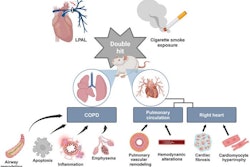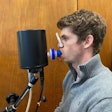
A study published in the New England Journal of Medicine has found that mepolizumab led to a lower rate of moderate or severe exacerbations in patients with COPD and an eosinophilic phenotype when added to background triple-inhaled therapy.
According to the study, “Mepolizumab to Prevent Exacerbations of COPD With an Eosinophilic Phenotype,” 804 patients were randomized into two groups: 403 received mepolizumab, while the remaining 401 received a placebo. The researchers found the rate of moderate or severe exacerbations was significantly lower with mepolizumab than with a placebo.
In addition, the time to the first moderate or severe exacerbation was longer with mepolizumab than with placebo. A 35% reduction in the annualized rate of exacerbations leading to emergency department visits and/or hospitalization was also shown with mepolizumab compared to the placebo.
These results are part of the ongoing phase 3 MATINEE trial.
GSK, which manufactures mepolizumab under the brand name Nucala, said in a news release that mepolizumab — a monoclonal antibody targeting interleukin-5 — is the only biologic with data that has shown a reduction in emergency department visits and hospitalizations in a phase 3 trial.
“[These] MATINEE results show that mepolizumab can help prevent exacerbations, including those leading to emergency room visits and/or hospitalization,” said Kaivan Khavandi, MD, PhD, senior vice president and global head of respiratory, immunology and inflammation research and development at GSK. “These exacerbations are devastating for patients, known to cause irreparable lung damage, worsening of symptoms and increased mortality.”
Nucala is not currently approved for the treatment of COPD in any country. Regulatory submissions are currently under review in several countries, including the United States, China, and the European Union.























